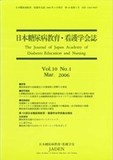Japanese
English
- 有料閲覧
- Abstract 文献概要
- 参考文献 Reference
- サイト内被引用 Cited by
糖尿病外来通院患者133名(家族と同居)を対象に,治療満足・自尊感情の影響要因を明らかにするため,家族サポートに焦点を当てた調査を行った.分析枠組みは,プリシードモデルを参考にし,従属変数は治療満足と自尊感情,独立変数は属性要因,糖尿病の管理ストレス,家族の結びつき,家族のサポート,自己管理行動とした重回帰分析,モデル検証は,自己管理行動,自尊感情,治療満足を内生変数としたパス解析を行った.結果,治療満足の影響要因は,糖尿病の管理ストレス,自尊感情,自己管理行動,インスリン注射の有無,年齢,家族の適度な結びつき,配偶者との同居で,自尊感情の影響要因は,糖尿病の管理ストレス,配偶者との同居,家族の結びつきであった.パス解析より,糖尿病の管理ストレスが低く,自己管理行動がよいと,自尊感情が高く保たれ,治療満足が高くなっていた.配偶者からの手助け,家族の適度な関係性の構築が,治療満足につながることが示唆された.
Questionnaire survey was performed in 133 diabetic outpatients living with family to identify psychosocial factors that affect treatment satisfaction and self-esteem in adults with diabetes. This study was focused on family support. Precede model was referenced for the framework of analysis. Multiple regression analysis was performed with treatment satisfaction and self-esteem as dependent variables and demographic factors, diabetes management stress, family cohesion, family support, and self-management behaviors as independent variables. Path analysis was performed to test analytic model with self-management behaviors, self-esteem, and treatment satisfaction as endogenous variables. Psychosocial factors that affect treatment satisfaction were diabetes management stress, self-esteem, self-management behaviors, the presence of insulin injection, age, adequate family cohesion, and living with spouse. Factors that affect self-esteem were diabetes management stress, living with spouse, and family cohesion. Path analysis revealed that lower diabetes management stress and better self-management behaviors were associated with enhanced self-esteem and higher treatment satisfaction. Our results suggested that support from spouse and the development of adequate family cohesion lead to high level of treatment satisfaction.
Copyright © 2006, Japan Academy of Diabetes Education and Nursing. All rights reserved.


